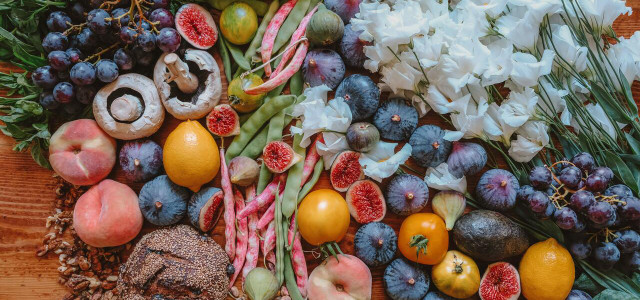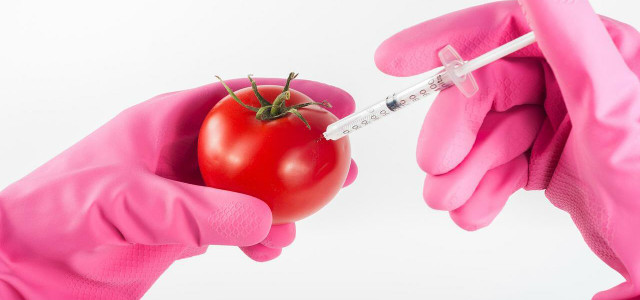The term gets thrown around a lot, but what does "organic" mean, exactly? We go past the misinterpretations and dive into what you can actually expect when buying organic.
Everyone’s heard of it, but ask anyone on the street what “organic” actually means, and they’re likely to freeze.
Put simply, organic refers to anything derived from living matter — anything biological. But, when it comes to food, organic refers to food grown or produced without genetic modification or artificial pesticides, chemicals or fertilizers.
Consumers perceive organic food as more nutritious, natural and environmentally friendly than non-organic or conventional food. Whether that’s true or not, we’ll take a closer look at.
Where Did ”Organic” Come From?
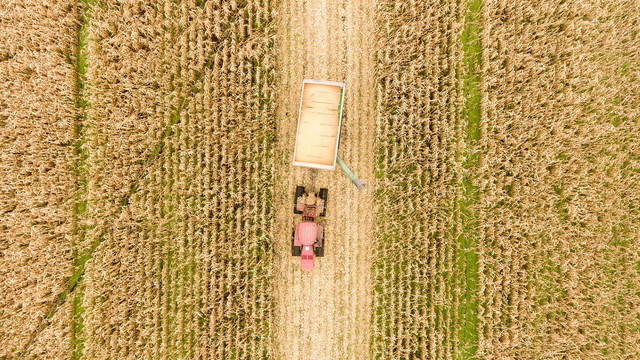
(Foto: CC0 / Pixabay / kingimaging)
For millennia, all the food that humans ate was completely organic. It came straight up off the ground, was minimally processed, and landed straight on your plate (or in your mouth). That all changed in the mid-1900s. Due to a booming post-war population and disastrous famines like the 1940s Bengal Famine in India (the world’s worst recorded), technology was harnessed to increase harvest yields. This period became known as the Green Revolution.
The Green Revolution was a success, and high-yield varieties of wheat and rice grew considerably. Countries like India and Mexico became less dependent on imports, farmers’ incomes increased dramatically and most importantly, millions were spared from hunger and poverty.
However, the enormous strides made with the Green Revolution were beset by numerous issues. Large swathes of land in India and beyond were largely neglected by its advances, limiting its reach for all who needed it. In addition, groundwater was redirected to feed these new, modified, water-thirsty crops, upsetting the natural composition of millions of acres of land.
Most notably, regarding what food is considered organic, large-scale use of pesticides and synthetic nitrogen fertilizers to produce higher yields and more varieties began to harm crops and soil. The effects of some chemicals were not, and are arguably still not, fully known. However, pesticides used to protect crops necessarily harm wildlife, as they kill targeted animals, and can also hurt humans.
Low levels of pesticides don’t necessarily have much of an effect; however, the EPA has warned that some pesticides:
- impact the nervous system
- may be carcinogenic
- affect the hormone or endocrine system
Enter: the organic movement. Reacting against the growing reliance on chemicals in agriculture, the organic movement which can be traced back to the beginning of the 1800s, began to really take shape in US during the 1970s. The distinction between organic and conventional food also became better defined, and locally grown, chemical-free produce was promoted through slogans such as “Know Your Farmer, Know Your Food” across the country.
This decade saw major strides in the coming together of various local and global organic associations. For example, 1972 saw the inception of the International Federation of Organic Agriculture Movements (IFOAM), which combined organizations from Germany, Australia, the UK, the US and others.
The movement has grown steadily since. The purchasing of organic foodstuffs has risen every year since 1990. Organic food sales in the United States now total nearly $40 billion annually. The first comprehensive look at organic purchases by American households on a state-by-state level showed that 82.3 percent of participating households reported purchasing organic regularly throughout 2016, up 3.4 percent from 2015.
Is Eating Organic Healthier?
Americans’ appetite for organic foods has grown steadily over the past few decades. According to the Economic Research Service, retail sales of organic foods almost doubled between 2011 and 2021. Overall, there has been a steady uptick of about 10 percent annual growth in retail sales since 2008.
Why?
Most Americans believe organic produce is healthier than conventionally grown produce. The fact that there are no (or fewer) added artificial chemicals with complicated or unfamiliar names means buyers of organic produce know what they’re getting. It may seem reasonable to assume that, since they are grown more “naturally,” organic products are healthier. However, that claim is difficult to back up.
At least one recent meta-analysis reviewing more than 300 studies found that, on average, organic foods have higher levels of antioxidants. But having more antioxidants is not necessarily sufficient to ensure foods are more nutritious. The science surrounding the question if organic foods are healthier is decidedly inconclusive. Basically, science can’t prove that organic food has more nutrients.
Should I Bother Buying Organic?
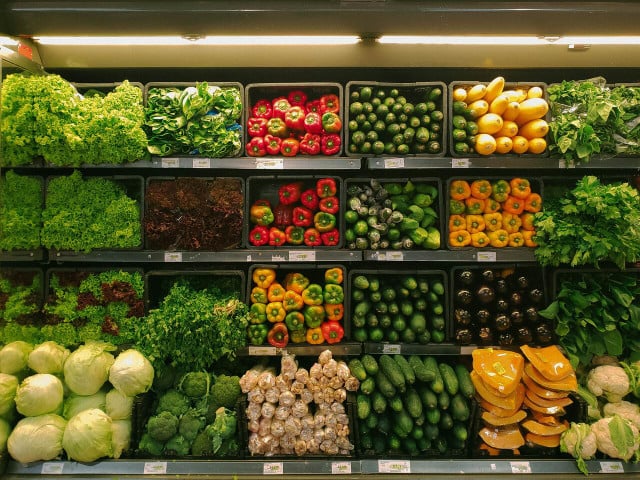


(Foto: Photo: CC0 Public Domain / Unsplash - nrd)
There are other important factors, however.
The first is difficult to prove objectively but could be the most persuasive to those considering making the switch. Organic food tastes better. This is believed to be linked to the higher antioxidants found in organic foods.
The second is likely important to Utopia’s readers. Organic farming is widely considered to be more sustainable. The USDA farm in Beltsville, Maryland, has tested organic versus conventional agriculture since 1993. While “all conventional [farming] is not the same, and all organic [farming] is not the same,” findings show that the farm’s organic plots:
- have more fertile soil
- use less fertilizer and herbicide
- are more energy-efficient
- lock more carbon into the soil
- are more profitable for farmers
Conventional systems, however:
- yield more produce
- are best at reducing land erosion
Even without the extra health benefits, flavor and ecological impact are two strong reasons to choose an organic product over a conventionally-grown one.
How Do I Know What’s Organic and What’s Not?
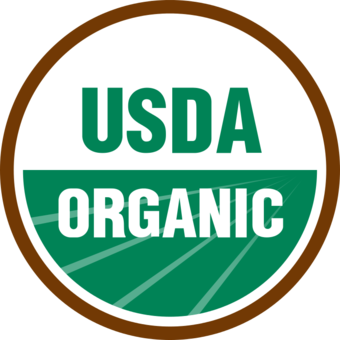


(Foto: "USDA organic seal.svg." by Chris Martin under Public Domain)
The National Organic Program enforces the organic regulations in the US, awarding products the USDA Organic Seal (pictured above) when they meet certain criteria surrounding production, handling and labeling. The standards address a variety of factors, including:
- soil quality
- animal raising practices
- pest and weed control
If synthetic fertilizers, sewage sludge, irradiation or genetic engineering are used, the product cannot be labeled with the USDA Organic Seal.
However, just because something has the official seal doesn’t mean it’s 100% organic. There are four distinct labeling categories for organic products:
- 100 percent organic: Products are made of 100 percent certified organic ingredients.
- Organic: The product is at least 95 percent organic. The non-organic ingredients are included in the National List of Allowed and Prohibited Substances.
- “Made with” organic ingredients: A minimum of 70 percent of the product is made from certified organic ingredients. The product cannot feature the official seal or be represented as organic.
- Specific organic ingredients: These products have more than one ingredient that falls under 70 percent certified organic content. They aren’t certified as organic themselves and can’t display the official seal.
If you’re based outside the US, traveling, or simply want to see organic seals from around the world, check out this organic logos glossary.
Arguments and Criticism
Despite the apparent pros of organic farming and its ever-growing popularity in the US and beyond, organic farming’s lower yields hinder its reputation as a sustainable alternative to conventional farming.
Organic farming requires more land than conventional farming (as animals are allowed to graze, a variety of plants share a plot to promote biodiversity, etc.) to yield the same amount of produce as conventional farming. This is the most significant con for organic products, and it has a variety of consequences. Researchers from Chalmers University of Technology have said that;
“Organic farming has many advantages, but it doesn’t solve all the environmental problems associated with producing food. There is a huge downside because of the extra land used to grow organic crops… if we use more land for food, we have less land for carbon sequestration. The total greenhouse gas impact from organic farming is higher than conventional farming.“
Whilst this study has faced criticism due to its small sample size (only two farms in Sweden), the point they make about land is a hard one to get around. A recent study published in the journal Nature Communications concludes that the widespread adoption of organic farming practices in England and Wales would lead to increases in greenhouse gas emissions. This is mainly because agricultural yields would be 40 percent lower.
Consider that by 2050, the demand for food will increase by an estimated 59 to 98 percent due to the ever-increasing global population. It’s important that efforts to feed this population are made whilst adapting to climate change and an ever-shrinking margin of arable land.
However.
Whilst academics are generally split on the effectiveness of organic farming compared to conventional farming, they do generally agree that it is more environmentally sustainable to swap conventionally reared beef for organic chicken, or better yet, to stick to a plant-based diet and stop eating meat altogether.
Read more:
- How to Keep Your Produce Fresher for Longer
- Organic Cotton Duvet Covers: 5 Comfortable and Sustainable Brands
- The 8 Best Organic Clothing Brands for Kids
Important Information regarding Health-related Topics.
** Links to retailers marked with ** or underlined orange are partially partner links: If you buy here, you actively support Utopia.org, because we will receive a small part of the sales proceeds. More info.Do you like this post?






